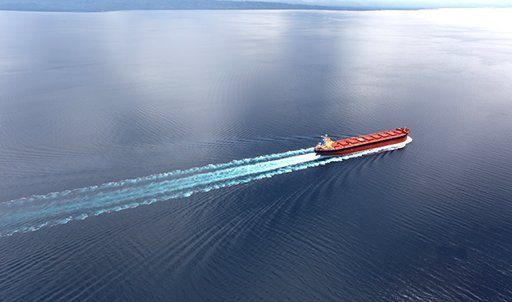Emmanuel Macron puts ship speed regulation at the top of his environmental agenda

Regulating the speed of ships is back in the news with France’s president, Emmanuel Macron, stating publicly on Saturday that the initiative was his number one environmental goal.
“Very solemnly, for the first time, we will engage with shipping companies to reduce the speed [of merchant ships],” Macron said ahead of the opening of the G7 summit in Biarritz (see video below).
Macron said he would be discussing the measure with other heads of state.
“It is one of the most effective ways to reduce greenhouse gas emissions globally and this measure would be a real change,” Macron said.
Splash understands that Macron has tapped Rodolphe Saade, the chairman of Marseille’s CMA CGM, to lead a new green shipping lobbying group.
In April this year France made a submission to the International Maritime Organization (IMO) urging for a swift global speed limit for shipping in a bid to slash the industry’s emissions.
Under Macron, the architect of the 2016 Paris Agreement on climate change, France has become one of the most aggressive advocates of society moving quicker to decarbonise. France believes that in order to meet climate goals set out in the Paris Agreement shipping needs to act faster than goals set out by IMO to get decarbonisation regulations moving by 2023.
Reducing speed for most ship sectors would work as an “excellent transitionary and early measure”, France stated in its April submission, albeit admitting it would be merely a temporary measure. The French submission concedes that for certain ship types the measure would not work. These ship types included passenger ships and vessels carrying time sensitive cargo that would be forced to go on greater polluting forms of transport if a speed ban came in.
Reacting to Macron’s public statement, Marin Dorsman, the secretary-general of the European Community Shipowners’ Association (ECSA), told Splash today the go slow movement needs “careful consideration”.
“The shipping industry is a very diversified industry and mandatory speed reduction might have different and perhaps unwanted consequences,” Dorsman said.
The International Maritime Organization (IMO) will discuss the proposal again later this year as well as other possible short-term emission reduction measures.
Greece has also joined France in calling for speed limit proposals.
The original architect of the go slow movement in shipping is Philippe Louis-Dreyfus, the 74-year-old president of Louis Dreyfus Armateurs. The French tycoon has been calling for ship speed regulations for most of the past decade and he was able to get the support of the French president when he went for a lunch with Macron at the Élysée Palace in January this year.
A number of cargo interests have come out in favour of the French proposal, notably Trafigura, one of the world’s largest commodity trading houses.
Trafigura has added a clause to its standard terms and conditions with shipowners this year, requiring information that will allow the company to track how much fuel is consumed per metric tonne of cargo loaded while transporting Trafigura controlled cargoes.
“Trafigura is supportive of a prompt implementation – within six to18 months – of a slow steaming policy as this would have an immediate impact on reducing GHG emissions. This is required, as hybrid fuels or battery technology still seems to be far away for use in tankers where the future load and discharge ports often are unknown,” Rasmus Bach Nielsen, head of wet freight shipping for Trafigura, told Splash in May.
The other short-term measures taken forward at IMO for further discussion in November are a goal-based operational efficiency metrics proposal championed by Denmark and a Japanese idea to install shaft power limits on all ships.
The world’s top two global shipping bodies, BIMCO and the International Chamber of Shipping, have made their positions clear on the issue, both coming out firmly against speed limits.
Şadan Kaptanoğlu, who was elected president of BIMCO in May, told Splash earlier this year her association’s position when it comes to finding a suitable short-term measure to cut GHG emissions is in line with the Danish proposal.
“We believe in maintaining level playing fields and creating an environment for innovation,” Kaptanoğlu said.
Au cœur de ce #G7Biarritz : le climat et la biodiversité. L’océan et la forêt qui brûle en Amazonie nous appellent. Il nous faut leur répondre. Et de manière concrète.
Sur ces sujets, le temps n’est plus aux paroles, mais aux actes. Voici ceux que je défendrai : pic.twitter.com/0LVNrXKiUP
— Emmanuel Macron (@EmmanuelMacron) August 24, 2019

Wa about Planes ?
If we all go back to Cart and Horse we slow down defenitly.